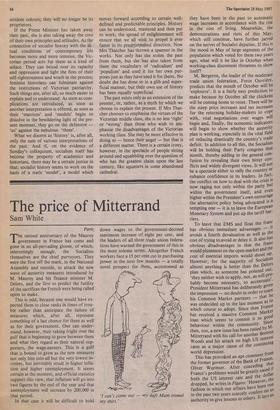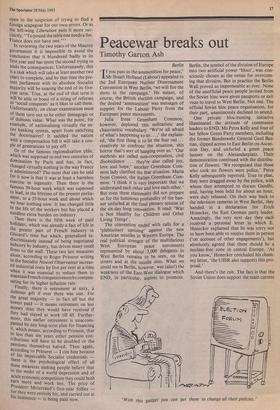The price of Mitterrand
Sam White
Paris
The second anniversary of the Mauroy government in France has come and gone in an all-pervading gloom, of which, interestingly enough, the Socialists themselves are the chief purveyors. They were the first off the mark, in the National Assembly and outside, to attack the new wave of austerity measures introduced by M. Mauroy and his finance minister M. Delors, and the first to predict the futility of the sacrifices the French were being called upon to make.
This is odd, because one would have ex- pected them to close ranks in times of trou- ble rather than anticipate the failure of ,measures which, after all, represent something of a last chance for them as well as for their government. One can under- stand, however, their taking fright over the gulf that is beginning to grow between them and what they regard as their natural sup- porters, the wage-earners. This is a gulf that is bound to grow as the new measures not only bite into all but the very lowest in- comes, but inevitably result in higher infla- tion and higher unemployment. It seems certain at the moment, and official statistics support this view, that inflation will go into two figures by the end of the year and that unemployment will increase by 200,000 in that period.
In that case it will be difficult to hold down wages to the government-decreed maximum increase of eight per cent, and the leaders of all three trade union federa- tions have warned the government of this in the most solemn terms. Altogether French workers face a 15 per cent cut in purchasing power in the next few months — a totally novel prospect for them, accustomed as
'1 can't come out — my daft Mum ironed my shirt.'
they have been in the past to automatic wage increases in accordance with the rise in the cost of living. Meanwhile, the demonstrations and riots of this May, which still continue, have further jarred on the nerves of Socialist deputies. If this is the mood in May of large segments of the population which voted for them two years ago, what will it be like in October when working-class discontent threatens to show itself?
M. Bergeron, the leader of the moderate trade union federation, Force Ouvriere, predicts that the month of October will be `explosive'. It is a fairly easy prediction to make because by October all the chickens will be coming home to roost. There will be the steep price increases and tax increases for the returning holiday-makers to cope with, vital negotiations over wages will begin and, finally, the economic indicators will begin to show whether the austerity plan is working, especially in the vital field of reducing drastically the country's trade deficit. In addition to all this, the Socialists will be holding their Party congress that month, thereby adding to the general con- fusion by revealing their own bitter con- flicts and widely divergent views. It will not be a spectacle either to rally the country or enhance confidence in its leaders. In fact, the conflict on how to deal with the crisis is now raging not only within the party but within the government itself, and even higher within the President's own entourage the alternative policy being advocated is a tempting one — it is to leave the European bar- riers.
System and put up the tariff bar-
To leave that EMS and float the franc has obvious immediate advantages — it avoids a fourth devaluation as well as the cost of trying to avoid or delay it. It also has obvious disadvantages in that the franc would plumment on the open market and the cost of essential imports would shoot tiP. However, for the majority of Socialists almost anything is better than the Delors plan which, as someone has pointed out, 'they neither wish to apply, nor, as will pro- bably become necessary, to accentuate . President Mitterrand has deliberately given the impression — no doubt in order to scare his Common Market partners — that he was undecided up to the last moment as to which course to adopt. Since then France has received a massive Common Market . loan which seems to commit it to gOod behaviour within the community. Since then, too, a new issue has been raised by M. Mitterrand with his call for another Bretton Woods and his attack on high US interest rates ascause of the continuing world This has provoked an apt comment from the former governor of the Bank of France, Oliver Wurmser. After conceding France's problems would be greatly eased if both the US interest rate and the dtlaer dropped, he writes in Figaro: `Howeverol the fashion in which our affairs have been run us in the past two years scarcely confers on
authority to give lessons to others. It lays us
open to the suspicion of trying to find a foreign scapegoat for our own errors. Or as the left-wing Liberation puts it more suc- cinctly. To pound the table one needs a fist. France does not have one."
In reviewing the two years of the Mauroy government it is impossible to avoid the conclusion that it blundered badly in its first year and has spent the second trying to undo the consequences. Unfortunately, this is a task which will take at least another two Years to complete, and by that time the pre- sent parliament with its absolute Socialist majority will be nearing the end of its five- year term. True, at the end of that term it will be able to boast of a string of reforms or 'social conquests' as it likes to call them. Unfortunately, on closer examination most of them turn out to be either demagogic or of dubious value. What was the point, for example, of nationalising virtually the en- tire banking system, apart from satisfying the doctrinaires? It saddled the nation with a compensation bill it will take a cou- ple of generations to pay off.
Or of the famous regionalisation pldn, which was supposed to end two centuries of domination by Paris and has, in fact, changed virtually nothing in the way France Is administered? The most that can be said for it now is that it was at least a harmless exercise in ingenuity. Then there is the famous 39-hour week which was supposed to lead, in the lifetime of the present parlia- ment, to a 35-hour week and about which We hear nothing now. It has changed little in the life of the workers but has placed a needless extra burden on industry. Then there is the fifth week of paid holidays, which was already a fact of life in the greater part of French industry in Giscard's time but which, generalised in- discriminately instead of being negotiated industry by industry, has driven many small firms to the wall. These two last measures alone, according to Roger Priouret writing in the Socialist Nouvel Observateur increas- ed industrial costs by five per cent at a time when it was essential to reduce them to maintain French competitiveness bycompen- sating for its higher inflation rate. Finally, there is retirement at sixty, a dubious gift if ever there was one. For the great majority — in fact all but the lowest paid — it means retirement on less money than they would have received if they had stayed at work till 65. Further- more, this earlier retirement is unaccom- panied by any long-term plan for financing it, which means, according to Priouret, that in less than ten years either pension con- tributions will have to be doubled or the pensions themselves halved. Then again, according to Priouret — I cite him because of his impeccable Socialist credentials there is the psychological effect of all these measures making people believe that in the midst of a world depression and of acute economic competition they could both earn more and work less. The price of President Mitterrand's first-year follies -
for they were entirely his, and carried out at his insistence — is being paid now.















































 Previous page
Previous page